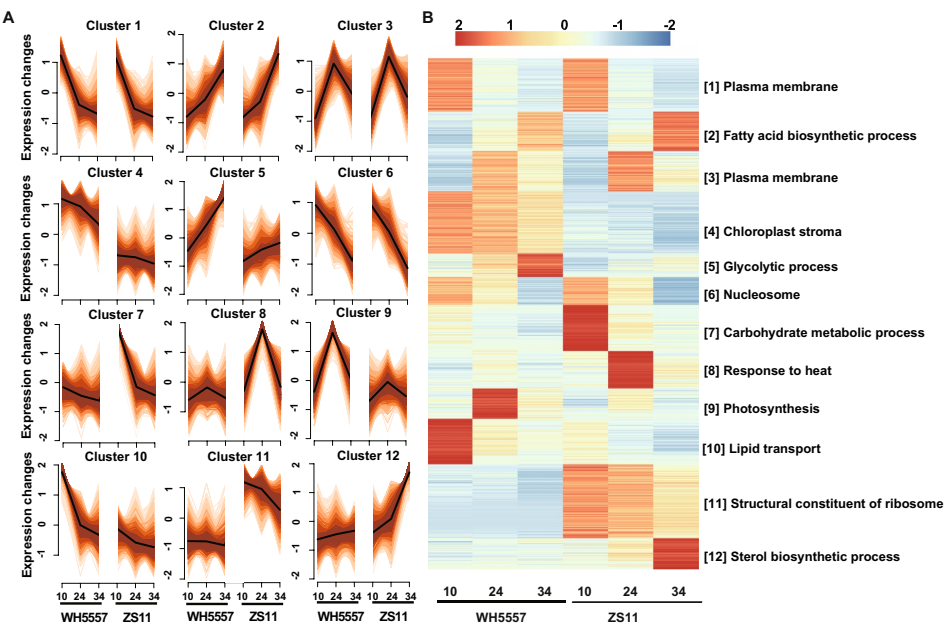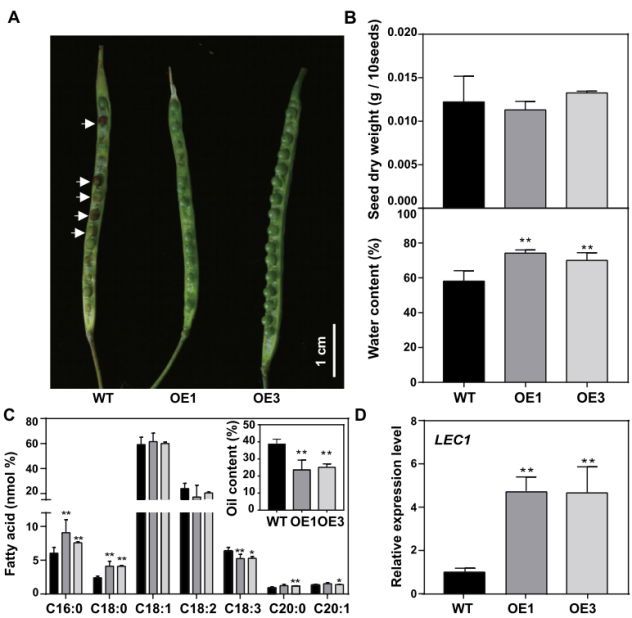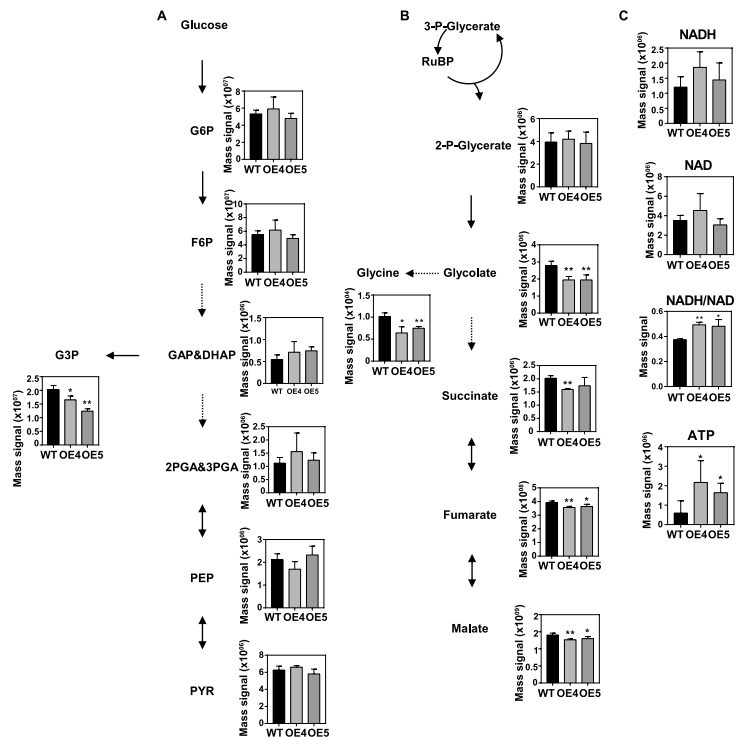南湖新闻网讯(通讯员 李雨晴)近日,我校油菜团队研究成果以“Regulation of seed oil accumulation by lncRNAs in Brassica napus”为题在Biotechnology for Biofuels and Bioproducts发表。研究揭示了lncRNA(long non-coding RNA)可以参与油菜种子油脂合成过程,并探索了lncRNA影响油菜种子油脂积累的潜在机制。该研究结果不仅丰富了油菜油脂代谢的调控机制,还为高油油菜籽遗传改良提供了新线索和理论。
甘蓝型油菜是世界上第三大油料作物,约占全球植物油产量的15%。前人的研究已经很好地阐明了许多转录因子和基因参与了种子油脂生物合成的作用机制,但关于种子油脂合成过程中的调控研究较少。近年来,lncRNAs(long non-coding RNA)被报道可以通过多种作用机制影响植物的生长、发育及抗逆等。尽管lncRNA也被预测可能参与调控油料作物种子发育过程中脂质代谢过程,但一直缺乏lncRNA影响种子油脂代谢的直接证据。

图1 甘蓝型油菜种子发育过程中lncRNA-mRNA表达量动态变化
该研究通过比较高低含油量油菜种子三个发育阶段lncRNA的表达量变化差异及lncRNA-mRNA的共表达变化(图1),鉴定并筛选了一批可能参与油菜种子脂质代谢的lncRNAs。对3个候选的lncRNA进行功能验证,其中有2个lncRNA(MSTRG.86004和MSTRG.22563)可以影响油菜种子含油量的积累。

图2 MSTRG.86004过表达植株种子发育40天时表型、含油量及LEC1表达量变化

图3 MSTRG.22563过表达植株种子发育32天时代谢物含量变化。
实验结果表明,与WT相比,MSTRG.86004过表达株系的种子含油量增加了约2%,而MSTRG.22563过表达株系减少了3.1-3.9%。进一步研究表明,MSTRG.86004过表达株系种子中,参与脂肪酸合成和种子胚胎发育的基因(如LEC1)的表达量增加(图2),但参与TAG合成相关的基因表达量下降。而MSTRG.22563过表达株系中大多数与脂质代谢有关的基因表达量显著降低,参与细胞呼吸和三羧酸循环过程中的相关代谢产物的含量减少(图3)。
以上结果暗示MSTRG.86004可能在延长种子发育时间以增加种子含油量方面起作用,而MSTRG.22563可能通过影响种子的光呼吸作用和三羧酸循环影响种子含油量。
华中农业大学植物科学技术学院博士后李雨晴为论文第一作者,博士研究生谭增栋负责生物信息学分析,鲁少平副研究员为论文通讯作者,团队的其他老师及多位研究生参与了此项研究。
审核人:鲁少平
【英文摘要】
Background
Studies have indicated that long non-coding RNAs (lncRNAs) play important regulatory roles in many biological processes. However, the regulation of seed oil biosynthesis by lncRNAs remains largely unknown.
Results
We comprehensively identified and characterized the lncRNAs from seeds in three developing stages in two accessions of Brassica napus (B. napus), ZS11 (high oil content) and WH5557 (low oil content). Finally, 8094 expressed lncRNAs were identified. LncRNAs MSTRG.22563 and MSTRG.86004 were predicted to be related to seed oil accumulation. Experimental results show that the seed oil content is decreased by 3.1–3.9% in MSTRG.22563 overexpression plants, while increased about 2% in MSTRG.86004, compared to WT. Further study showed that most genes related to lipid metabolism had much lower expression, and the content of some metabolites in the processes of respiration and TCA (tricarboxylic acid) cycle was reduced in MSTRG.22563 transgenic seeds. The expression of genes involved in fatty acid synthesis and seed embryonic development (e.g., LEC1) was increased, but genes related to TAG assembly was decreased in MSTRG.86004 transgenic seeds.
Conclusion
Our results suggest that MSTRG.22563 might impact seed oil content by affecting the respiration and TCA cycle, while MSTRG.86004 plays a role in prolonging the seed developmental time to increase seed oil accumulation.
